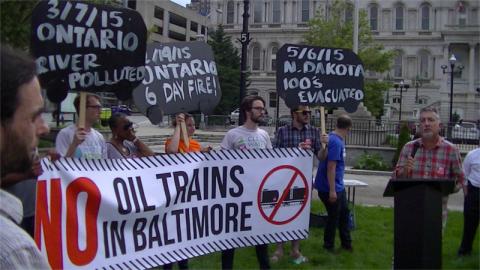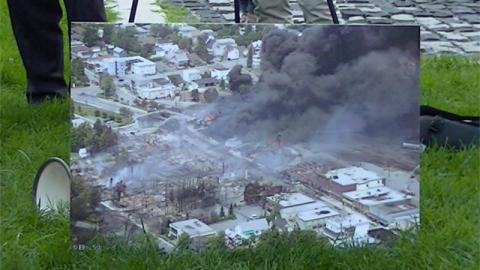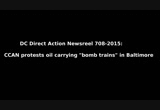CCAN protests oil carrying "bomb trains" in Baltimore
On the 8th of July, Chesapeake Climate Action Network (CCAN) protested in front of Baltimore City Hall to support local residents and activists demanding a ban on the growing number of "bomb trains" entering the city. In the past two years there have been a growing number of trains carrying Bakken crude oil to or through Baltimore. These trains are called "bomb trains" due to the severe damage caused by them in recent railroad accidents, including the incineration of half of one small town.
According to CCAN's alert for this rally, "The Maryland Department of the Environment (MDE) has so far blocked a Targa Resources' permit to transport heavy crude by rail through Baltimore, but the agency asked for more information." Unfortunately it seems other carriers are already moving these trains through the city, but Big Oil isn't satisfied. If they can extablish the ability to handle Bakken crude and later "dilbit" from the Canadian Tar Sands as well, Baltimore could be used as an export port for both fracked and tar sands oil. The strategic importance of denying frackers and tar sands miners access to ports for export cannot be understated! Export of such huge deposits of fossil fuels could mean "game over" for the climate. Long before that can ever happen, however, a single accident with one of these trains could mean "game over" for a large part of Baltimore.
One speaker at the rally survived a railroad tank car derailment in her town that released a cloud of vinyl chloride and sickened her and her daughter. Claims that railroads can ensure zero accidents ring hollow in the face of such testimony.
Bakken Crude (fracked) oil is carried in DOT-111 railroad tank cars with a capacity that can be as much as 20,000 gallons. Heavy crude oil can be nearly as heavy on a volume basis as water (8 pounds/gallon) as opposed to light crude that may be only 0.85 times the weight of water, for about 6.5 pounds per gallon. For heavy crude that is a tanker cargo weight of 160,000 pounds. By comparison a B-52 bomber has a maximum bomb load of 70,000 pounds. Thus, a single exploding tank of Bakken crude is roughly comparable to an air strike on a single spot by a pair of B-52 bombers loaded with napalm, except that napalm is less toxic and does not burn as long, lacking the heavy asphalt type fractions common in crude oil. In one recent derailment six of these tank cars burned. The recommended evacuation radius for an oil train accident is one mile, in Baltimore that includes City Hall and over 100,000 people in range of tracks and switches where this is likely.





